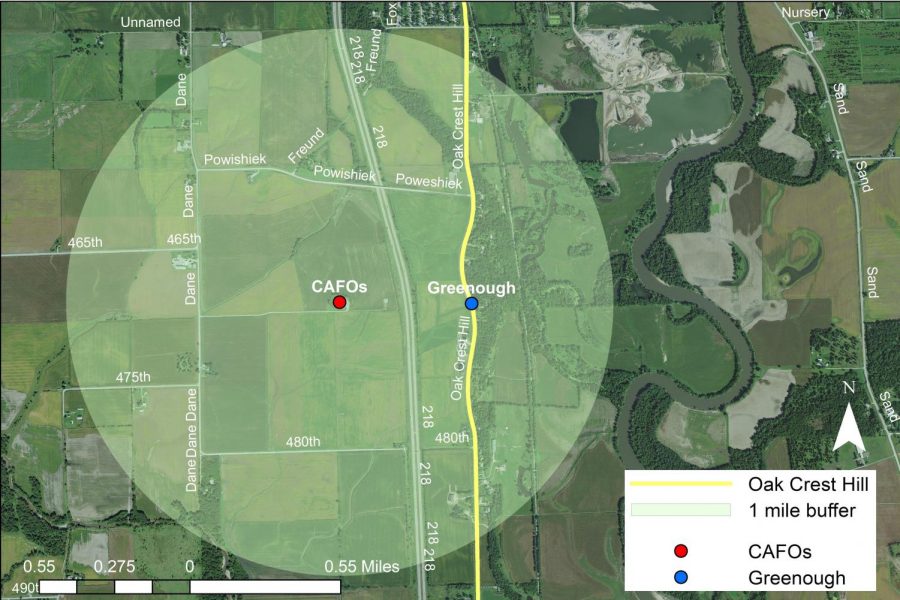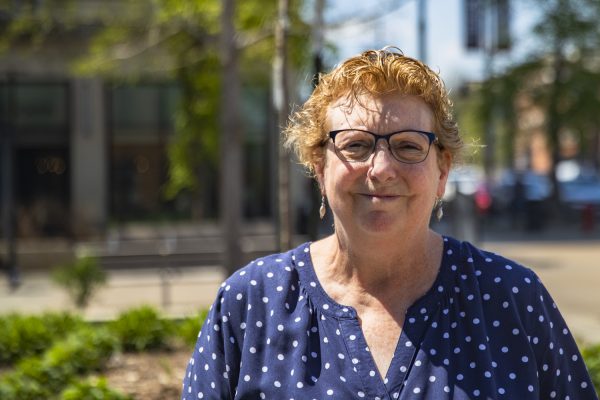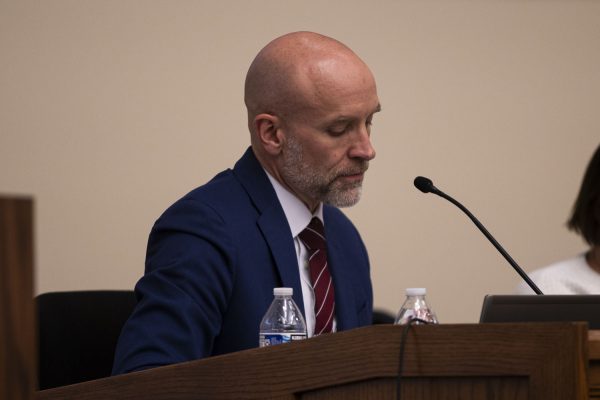Grannies and neighborhood activists fight local CAFOs
The unhappy neighbors of two local factory farms have teamed up with the 100 Grannies for a Livable Future to protest such operations around Johnson County.
December 13, 2018
Paul Greenough loves living on the rural outskirts of Iowa City. The UI professor emeritus of history and public health sleeps 50 feet away from rows of corn and miles from the city’s urban center.
But his countryside retirement has been disturbed by intermittent yet intense odors from pits of anaerobically decomposing hog manure; he also lives just a half mile from two of Johnson County’s more than 45 Concentrated Animal Feeding Operations — CAFOs, as some label them, factory farms, as others do.
“You can’t with any assurance ask folks to come over and barbecue with you, because you don’t know when the wind is going to shift,” Greenough said. “It makes outdoor life uncertain and unpleasant.”
Over the years, he and his discontented neighbors on Oak Crest Hill Road have protested such operations, writing letters to the operator, making phone calls to the county, and even threatening legal action, to no avail. This past summer, they took their activism to the next level, adopting the name Iowans for Clean Air and Water and teaming up with the local organization 100 Grannies for a Livable Future.
Stopping the proliferation of those operations in Johnson County is a major goal of the Grannies, approximately 100 senior women passionate about social and environmental issues. They are primarily concerned about greenhouse-gas emissions from such facilities, as well as potential threats to air and water quality and what they consider to be inhumane conditions.
“It’s killing our rural communities and creating enmity among neighbors,” said Miriam Kashia, a facilitator of the Grannies’ Community Activism Committee. “There’s not a lot good you can say about them except cheap meat.”
The national Socially Responsible Agricultural Project supports both groups. Consultant Diane Rosenberg advises the local Clean Air/Water group and the Grannies on organizational matters, including a recent meeting with Iowa City Mayor Jim Throgmorton and a presentation to City Council they will make Dec. 18. Through such efforts, they aim to sway public opinion against factory farms.
Ultimately, the collaborators want a statewide moratorium. This was first proposed in 2016 by the coalition Iowa Alliance for Responsible Agriculture; its proposal would bar the construction of such facilities until Iowa had fewer than 100 water impairments. Sen. David Johnson, R-West Branch, has also promoted the idea.
“The moratorium would give us a chance to really overhaul how we do things,” Rosenberg said.
It would allow the Iowa Department of Natural Resources, which oversees permitting for and regulation of the large animal operations, to reconsider current permitting standards and inspection habits, which a 2013 IowaWatch investigation found to be irregular, infrequent, and insufficient.
Local governments cannot in state such measures, but the Johnson County Board of Supervisors has expressed support for the statewide moratorium through symbolic votes, letters to DNR, and language in the 2018 Comprehensive Plan.
Still, the Clean Air/Water group and the Grannies approached the supervisors with a petition in October, urging them to develop more forceful measures for discouraging such animal-operation development. In it, the two groups referenced the owner of the neighboring operation by name, saying he defied his neighbors’ decade-old objections and the county’s resolution to support the moratorium. Greenough called it a “name-and-shame.”
“I think he probably has met all the regulations,” Greenough said. “The point is the regulations are toothless, and the mechanism for inspection is toothless, and our ability to affect this is feeble, so that’s why we’re turning to this matter of raising public opinion.”
The operator himself declined to comment to The Daily Iowan. The Clean Air/Water organization has been unable to contact him as well. Even if they could reach him, life on Oak Crest Hill Road would likely remain just as nauseating — those two confinements are a done deal.
“It will, hopefully, benefit others,” Greenough said. “It’s not going to do anything for us at all.”




















